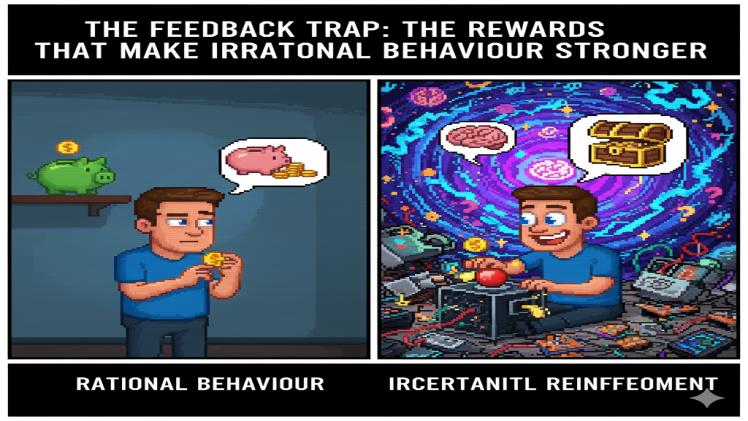We all like rewards. Be it the tiny buzz of a notification ping on your phone, a much-deserved bonus at work, or the prospect of spinning a digital wheel, rewards light a fire in the pleasure centers of our brains that feels nearly magical. However, this is a trap: at times, good things tend to strengthen the behavioural patterns that are… well, let’s just say, not entirely logical. Here is the hell of the feedback trap.
Learning to Escape the Feedback Trap.
A feedback trap, in its simplest form, is a reward system intended to encourage or delight that actually promotes behaviour that is not logically sensible. Consider it a trick done on your brain: you are rewarded, you do it again, and in time, you may be in pursuit of a greater reward than you even require.
We can observe it in everyday digital activities: likes on social media, streaks in mobile games, or spinning again in digital casinos. The trend is evident: immediate satisfaction leads to repeated involvement, which keeps the behaviour mostly conscious.
Why Rewards are so Irresistible.
Humans are not rational beings. Conditioned to react to incentives, even to the point of logic. This is especially evident in environments designed to capitalize on varying rewards or where the payoff is uncertain. Unpredictability is something our brains enjoy; the brain releases Dopamine in anticipation, making it feel like a thrill that can feel almost addictive, so you should casino withdrawal time.
An example is decision fatigue. In cases of choice repetition, our mental resources are deteriorated. Variable rewards also make decision-making much easier: we pursue the excitement rather than consider the probabilities. This strengthens behavioural patterns over time, which might be irrational but are neurologically fulfilling.
The principle is true even in tamed settings such as digital platforms. The psychological basis of systems that deliver intermittent rewards, whether in a streak of points or a minor online reward, exploits our cognitive biases, pushing us to engage repeatedly.
The Brain Science of the Trap.
The enchantment – and the snare – is in the head. The neurotransmitter commonly referred to as the feel-good chemical, Dopamine, does not simply respond to pleasure; rather, it responds to anticipation. That is why we thrill at the prospect of a reward and are, at times, even more thrilled by the reward than by the prospect.
When you are subjected to unpredictable rewards on many occasions, this builds a dopamine loop: your brain begins to desire the anticipation more than the reward. This is why the apparently minor or insignificant rewards may lead to the long-term repetition of certain behaviour, even when the rational mind is aware that it may not be reasonable.
Cognitive biases enhance the influence. Confirmation bias makes us believe our work has a greater impact than it actually does. Loss aversion causes us to hold on to it, having the fear of losing the one that eludes us. Biased thinking and the wiring of the brain are particularly difficult to overcome, and this is why feedback traps are so tenacious.
Digital Behaviors and Attitudes.
Online space is conducive to feedback traps. From mobile games to the online world, designers design reward systems to achieve optimal engagement. An example would be sites such as National Casino Australia, which provide built-in reward systems that drive people to return again and again without necessarily being malicious—but the mechanics are the same: loyalty points, spinning prizes, and time-based bonuses are all based on the brain’s reward circuitry.
Even more subtle behaviour is influenced by mechanisms of casino withdrawal, such as the timeframe within which players can withdraw their money. Immediate gratification can be achieved through a brief withdrawal period. Still, a process delayed a little further can motivate a repetition of the action, and the cycle will be further established.
Here is a simplified version of the way in which digital reward structures can shape behaviour:
| Digital Platform | Reward Type | Behavioral Impact |
| National Casino Australia | Loyalty points, bonus spins | Encourages repeated engagement before cashing out |
| Mobile Games | Daily streaks, surprise rewards | Boosts habit formation and session frequency |
| Social Media Apps | Likes, notifications | Reinforces compulsive checking, variable anticipation |
When the Rewards Become Unreasonable.
Why then are these patterns irrational? Due to the reward being, in most cases, larger than the reason. You may end up wasting time or other resources in pursuit of digital benefits which are not worth it in objective terms. The reward loop, however, is pleasurable to the brain.
This is more pronounced in the online and digital space. It could be a minor victory in a game, one streak in an app, or an in-game bonus in online games such as National Casino Australia, but the reward framework can be designed to encourage the repetition of behaviour indirectly, without necessarily addressing long-term objectives.
According to behavioural economists, this is a conflict between short-run satisfaction and long-run thinking. Meanwhile, neuroscientists emphasize the role of anticipation in strengthening habits, often making it more powerful than the reward itself. This is something that can be understood so that digital interaction is not about falling into a trap, but rather about a well-constructed system that is understood and avoided.
